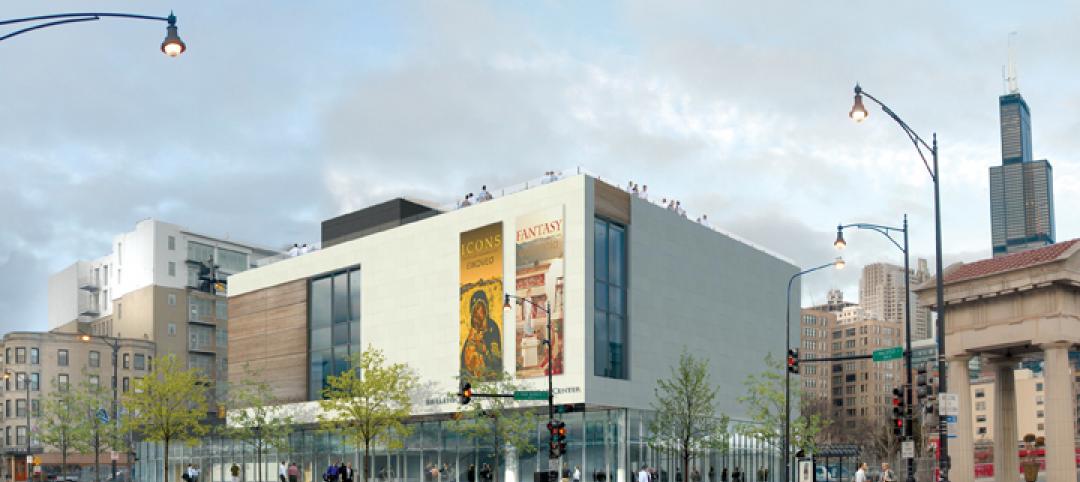AEC firms that have been pushing wellness for years say they finally have a receptive ear with developers and owners. “Developers sell this; they see it as an exciting new trend,” says Colin Rohlfing, AIA, LEED AP, Vice President and Director of Sustainability with HDR.
The advice about wellness these firms dispense to clients in many cases has already been road tested to make their own workplaces healthier.
New Orleans-based Eskew+Dumez+Ripple positions wellness to clients as “asset opportunities,” such as yoga rooms and classes, with the goal of keeping employees active, says Ian O’Cain, AIA, Associate and Project Architect. One of his firm’s recent projects is a new 30,200-sf, two-story office building in New Orleans that serves as the corporate headquarters for general contractor Palmisano Group. The $9 million building includes an in-house gym and yoga studio, green space, an active stairwell, and a racetrack layout that creates a circulation path for employees. The narrow floorplate (55 feet wide) lets in lots of light.
One of DPR Construction’s recent projects is a new office space in Charlotte, N.C., for Little Diversified Architectural Consultants. Chris Gorthy, a Project Executive with DPR, says that before embarking on this project, Little’s management toured several WELL-certified buildings, including DPR’s office in Reston, Va.
Little’s Charlotte office takes up 60,000 sf over 2½ floors of an existing building. Wellness certification accounted for about $8 per sf of its $150 per sf cost (including furniture), according to Little CEO Phil Kuttner, AIA, LEED AP, WELL AP. Its wellness features include a monumental staircase, access to drinkable water throughout, and ample natural lighting. Gorthy says the biggest challenge was upgrading the building’s air quality, which required educating the project’s subcontractors, setting up a temporary containment system, and figuring out how the air system could be cleaned.
Kuttner says the company assigned a team within its company to monitor the office’s air and water quality, conduct employee satisfaction and productivity surveys, and issue reports.
Last November, Clark Construction became the first GC in the U.S. to be a Fitwel Champion. As part of that agreement, Clark has identified seven of its offices—in Baltimore and Bethesda, Md.; Chicago; Irvine, San Diego, and San Francisco, Calif.; and Seattle—to achieve Fitwel certification.
“This is a way for our company to break through to our employees about its concern for their healthier living,” says Fernando Arias, Clark’s Director of Sustainability. He observes, too, that many of his firm’s clients “are in the same boat” and are looking for ways to provide healthier work environments to their employees.
Take, for example, a mixed-used project in Maryland that Carr Properties is developing known as The Wilson & The Elm, a 930,000-sf building with 360,000 sf of office space and 460 for-rent apartments. (The demolished building this replaces had been known as The Apex.) Arias says the genesis of this project was a meeting he had in early 2018 with the developer’s CEO Oliver Carr, which led to a presentation about wellness that Arias’ team made to Carr executives last April.
Carr Properties now has four projects registered with Fitwel, and The Wilson & The Elm is likely to be the second certified, following another Clark-built project: Midtown Center in Washington, D.C.
What prompted Carr Properties to move toward wellness, says its Senior Director of Development Jason Bockenek, was “a combination of our outlook as long-term owners of real estate, and increased demand driven by sophisticated tenants, catering to a younger workforce.”
Related Stories
| Jan 20, 2011
Community college to prepare next-gen Homeland Security personnel
The College of DuPage, Glen Ellyn, Ill., began work on the Homeland Security Education Center, which will prepare future emergency personnel to tackle terrorist attacks and disasters. The $25 million, 61,100-sf building’s centerpiece will be an immersive interior street lab for urban response simulations.
| Jan 19, 2011
Extended stay hotel aims to provide comfort of home
Housing development company Campus Apartments broke ground on a new extended stay hotel that will serve the medical and academic facilities in Philadelphia’s University City, including the University of Pennsylvania and the Children’s Hospital of Philadelphia. The 11,000-sf hotel will operate under Hilton’s Homewood Suites brand, with 136 suites with full kitchens and dining and work areas. A part of the city’s EnergyWorks loan program, the project aims for LEED with a green roof, low-flow fixtures, and onsite stormwater management. Local firms Alesker & Dundon Architects and GC L.F. Driscoll Co. complete the Building Team.
| Jan 19, 2011
New Fort Hood hospital will replace aging medical center
The Army Corps of Engineers selected London-based Balfour Beatty and St. Louis-based McCarthy to provide design-build services for the Fort Hood Replacement Hospital in Texas, a $503 million, 944,000-sf complex partially funded by the American Recovery and Reinvestment Act. The firm plans to use BIM for the project, which will include outpatient clinics, an ambulance garage, a central utility plant, and three parking structures. Texas firms HKS Architects and Wingler & Sharp will participate as design partners. The project seeks LEED Gold.
| Jan 19, 2011
Museum design integrates Greek history and architecture
Construction is under way in Chicago on the National Hellenic Museum, the nation’s first museum devoted to Greek history and culture. RTKL designed the 40,000-sf limestone and glass building to include such historic references as the covered walkway of classical architecture and the natural wood accents of Byzantine monasteries. The museum will include a research library and oral history center, plus a 3,600-sf rooftop terrace featuring three gardens. The project seeks LEED Silver.
| Jan 19, 2011
U.S. Green Building Council Welcomes New Board Directors
The U.S. Green Building Council (USGBC) has announced newly elected officers and new directors to its 2011 Board of Directors, including Elizabeth J. Heider from Skanska; Kirsten Ritchi from Gensler; and Dennis Maloskey, from the Pennsylvania Governor's Green Government Council.
| Jan 10, 2011
Michael J. Alter, president of The Alter Group: ‘There’s a significant pent-up demand for projects’
Michael J. Alter, president of The Alter Group, a national corporate real estate development firm headquartered in Skokie, Ill., on the growth of urban centers, project financing, and what clients are saying about sustainability.
| Jan 4, 2011
6 green building trends to watch in 2011
According to a report by New York-based JWT Intelligence, there are six key green building trends to watch in 2011, including: 3D printing, biomimicry, and more transparent and accurate green claims.
| Jan 4, 2011
LEED 2012: 10 changes you should know about
The USGBC is beginning its review and planning for the next version of LEED—LEED 2012. The draft version of LEED 2012 is currently in the first of at least two public comment periods, and it’s important to take a look at proposed changes to see the direction USGBC is taking, the plans they have for LEED, and—most importantly—how they affect you.
| Jan 4, 2011
California buildings: now even more efficient
New buildings in California must now be more sustainable under the state’s Green Building Standards Code, which took effect with the new year. CALGreen, the first statewide green building code in the country, requires new buildings to be more energy efficient, use less water, and emit fewer pollutants, among many other requirements. And they have the potential to affect LEED ratings.












